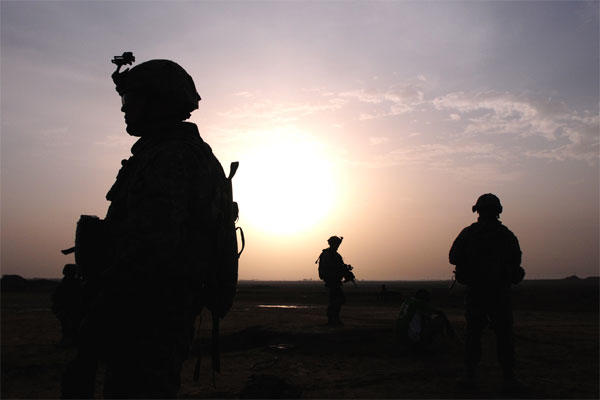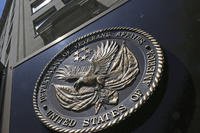The Pentagon denies it deliberately tried to hide the fact that U.S. troops were exposed to chemical agents, including mustard and sarin, during the Iraq War.
The Army on Friday apologized for its failure to properly care for Americans exposed to the chemical agents, promised to provide medical support to those affected and indicated some troops would be eligible for the Purple Heart.
But the Army on Monday said there was never any "conspiracy" to play down or conceal the chemical exposures, including from those who experienced them.
"We would never have told them they weren't exposed," said Juanita Chang, a spokeswoman for Army Under Secretary Brad Carson. "In this day and age of social media and cell phones and pictures, no way. There no reason we would do that."
In October 2014 The New York Times published a lengthy series based on documents acquired through Freedom of Information Act requests and interviews with Iraq War veterans, including 17 who were exposed to chemical agents. The Times said that about 5,000 chemical warheads, shells or aviation bombs were found by U.S. troops following the 2003 invasion.
Officer and enlisted personnel interviewed for the story said they were told to keep silent or provide as little information as possible about such exposures, including to sarin.
A former company commander told the Times the medical personnel treating his troops seemed bent on disproving their conditions were related to chemical exposure, while a former Army major said he was told to say nothing or dodge questions about finding chemical agents.
An Army sergeant who suffered mustard agent burns in 2007 told the paper he was denied hospital treatment and medical evacuation to the U.S. even after his commander requested it for him.
A lieutenant said a "gag order" was imposed on him and his unit after two of his soldiers were exposed to sarin, and they were ordered to tell family members they were exposed to "industrial chemicals."
Shortly after the Times story last October, the Defense Department ordered a review of standardized health surveys filled out by service members following deployment. Those surveys turned up 629 instances of troops reporting they may have been exposed to chemical agents, the paper reported in November.
DoD also established a hotline at its Army Public Health Command site that soldiers may call if they believe they were exposed, Chang said.
The Veterans Affairs Department added a new webpage to its site specific to Iraq and Afghan war chemical weapons exposure, and included the DoD's hotline number.
The VA's Office of Public Health also this month briefed representatives of veterans service organizations on the issue, VA spokesman Randy Noller said.
He said the department does not direct or require its staff to screen Iraq and Afghanistan war veterans for chemical agent exposure, but is offering health evaluations, if requested, under the Gulf War Registry Program set up for veterans of the Persian Gulf War. Noller said that registry includes questions regarding exposure to mustard and nerve agents.
A history of silence
The Army issued its apology on the eve of a Newsweek report claiming that some 200,000 American troops were exposed to nerve gas and chemical agents during the Gulf War in 1991. Defense officials denied for years that such exposures happened, with one administration after another coming under fire from veterans' advocates for failing to recognize a link between veterans' health problems and Gulf War service.
The DoD and VA's resistance to revealing all it knew about the exposures after 1991 and after 2003 is similar to the silence and stonewalling that greeted Vietnam War veterans when they began suffering the effects of exposure to Agent Orange and other defoliants used to clear jungle and areas around base perimeters.
The Times suggested Pentagon secrecy about the weapons and exposures from the latest Iraq War may have been politically motivated. The discovered chemical weapons were in a state of deterioration and dated from the 1980s – when Iraq was considered an ally against Iran – and likely were built using U.S.-supplied ingredients.
Also, none of the finds backed up the Bush administration's claim that Iraq was making and stockpiling chemical weapons at the time of the U.S. invasion.
Chang said there was never any "conspiracy" to keep knowledge of chemical exposures by U.S. troops secret. In some cases, she said troops were probably told not to talk about the discovery of such weapons, but for operational security.
"For ops-sec purposes we wouldn't want the enemy to know we were finding his weapons caches. You don't publish that," Chang said.
She also said the Times article focused on a failure to meet the long-term care of affected soldiers, and that would primarily be the responsibility of the Veterans Affairs Department.
"Soldiers knew if they were exposed," she said, "and if they reported it they received acute care."
-- This article has been updated to clarify that troops exposed to these chemicals would receive medical support and that some of these troops would be eligible for Purple Hearts, but not all.
-- Bryant Jordan can be reached at bryant.jordan@military.com





























